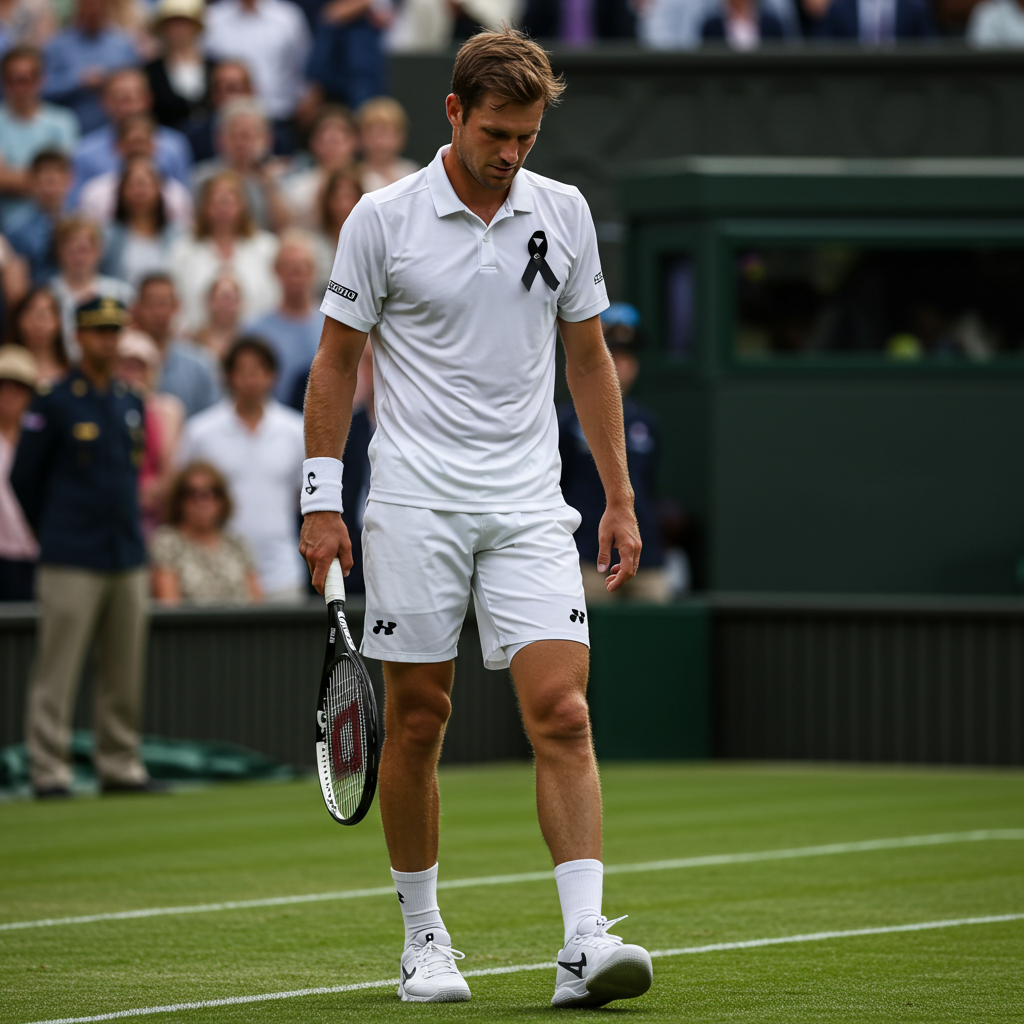wimbledon, renowned globally for its unwavering commitment to tradition, including its famously strict all-white dress code, has made a rare exception. In a poignant moment reflecting the intersection of elite sport and profound human tragedy, tournament officials permitted players to wear black ribbons as a mark of respect. This significant departure from the 148-year-old rule came in tribute to Portuguese footballer Diogo Jota and his brother Andre Silva, who tragically died in a car crash. The decision underscores the depth of feeling within the sporting community and the All England Club’s willingness to show compassion in extraordinary circumstances.
The Tragic Circumstances: Honoring Diogo Jota
The catalyst for this unprecedented allowance was the sudden and devastating death of Diogo Jota, the popular Liverpool and Portugal forward, aged just 28. Jota, alongside his 25-year-old brother, Andre Silva, perished in a car accident that occurred in the province of Zamora, northern Spain. The tragic event unfolded on a Thursday morning as the brothers were reportedly traveling by car. Their destination was England, where Jota was due to join his Liverpool teammates for the start of pre-season training. Doctors had reportedly advised him against flying following recent minor surgery, explaining the decision to travel by road and ferry.
News of Jota’s death sent shockwaves through the football world and his native Portugal. He was highly regarded, not just for his skill on the pitch but also as a person. Friends, teammates, and fans mourned the loss of a player considered an idol and an icon. Tributes poured in from across the Premier League and beyond, with clubs expressing their deep sorrow. Fans gathered at Anfield, Liverpool’s home ground, to pay their respects, highlighting the widespread impact of his passing. Jota’s death was particularly poignant as it came shortly after he married his long-term partner, Rute Cardoso, with whom he had three young children.
Players’ Tributes: A Symbol of Respect
Amidst the somber news, Portuguese tennis players competing at Wimbledon sought a way to publicly honour their compatriot. Francisco Cabral, a doubles specialist, was among the first to act. Hearing the devastating news while driving to the tournament venue, Cabral felt compelled to pay tribute to a figure who had meant so much to Portugal. He described Jota as “an idol, such an icon, such a good person,” whose career achievements were deeply inspiring. Cabral initially considered wearing a black strap but was informed this would not be permitted under the strict rules. He then requested permission to wear a small black ribbon.
Following discussions with the Referee’s Office, Cabral’s request was granted. He wore the black ribbon prominently on his shirt sleeve during his men’s doubles matches. Cabral expressed that it was “an honour” to wear the tribute, despite the regrettable circumstances. He hoped the small gesture might offer some comfort to Jota’s family and loved ones. Another Portuguese player, Nuno Borges, also joined in the tribute, wearing a black ribbon pinned to his cap during his singles match.
The gesture was not limited to Portuguese players. British doubles player Neal Skupski, a vocal Liverpool fan, also paid tribute. Skupski faced a particularly difficult day on the Thursday of Jota’s death, as he also learned of the passing of his grandmother. He chose to wear a black ribbon on his shirt front. Skupski had brought a black armband with him, initially intending to wear it, but ultimately opted for the ribbon, seemingly to honour both Jota and his grandmother during an incredibly tough personal time.
Wimbledon’s Historic Decision Explained
Wimbledon’s all-white dress code is arguably the most famous and strictly enforced rule in sport. For 148 years, players have been required to wear almost entirely white attire, with minimal exceptions. This tradition is a cornerstone of the tournament’s identity. Therefore, the decision by the All England Lawn Tennis Club (AELTC) to explicitly allow players to wear black ribbons represents a truly rare and significant moment in the tournament’s history. It underscores the gravity of the event being mourned and the collective desire within the sporting community to show solidarity.
The AELTC confirmed their position, stating they are “always open to having conversations with players regarding such matters.” They clarified that “given the tragic circumstances, the Referee’s Office has approved the players wearing a black ribbon as a mark of respect and condolence.” This official statement highlights the compassionate consideration given to the players’ requests. While exceptions have occasionally been made for minor details like trim colour length, a specific, widespread allowance for a non-white element for a tribute is highly unusual. The decision reflects a recognition that, sometimes, human empathy and the need to grieve publicly transcend even the most entrenched traditions. It also potentially opens a discussion, however small, about the flexibility of the dress code in future instances of significant, shared mourning or tribute within the sport.
Beyond the Court: Widespread Tributes
The black ribbons worn on the courts at Wimbledon were part of a larger wave of tributes to Diogo Jota and his brother. The news of their death resonated deeply across the sporting landscape. In Portugal, Jota was seen as a national hero. In England, his impact at Liverpool and in the Premier League meant he was widely admired and respected.
Tributes extended beyond tennis and football. A minute of silence was reportedly held before a Spain vs. Portugal football match, demonstrating the cross-sport and international impact of the tragedy. Premier League clubs, including rivals like Manchester City and Everton, issued statements expressing their shock and sadness, sending condolences to Jota’s family and Liverpool FC. The gatherings of fans at Anfield further illustrated the profound sense of loss felt by the community connected to the player. The silent, visible tributes at Wimbledon served as a high-profile, yet deeply personal, extension of this collective mourning, bridging the gap between the worlds of football and tennis through a shared expression of sorrow. The black ribbon became a simple yet powerful symbol uniting athletes across different sports in acknowledging a significant loss.
Frequently Asked Questions
Why did Wimbledon make an exception for players to wear black ribbons?
Wimbledon allowed players to wear black ribbons as a special mark of respect following the tragic death of Portuguese footballer Diogo Jota and his brother, Andre Silva, in a car crash. The All England Club’s Referee’s Office approved the request given the highly sensitive and tragic circumstances, recognizing the players’ desire to pay public tribute during the tournament despite the usual strict all-white dress code.
Which tennis players paid tribute to Diogo Jota at Wimbledon?
Several players paid tribute to Diogo Jota at Wimbledon by wearing black ribbons. These included Portuguese players Francisco Cabral and Nuno Borges, who wore the ribbons on their shirt sleeve and cap, respectively. British player and Liverpool fan Neal Skupski also wore a black ribbon on his shirt front, also mourning the recent death of his grandmother.
How unusual is it for Wimbledon to relax its dress code rules?
It is extremely unusual for Wimbledon to relax its famously strict all-white dress code, which has been in place for 148 years. While minor exceptions for small trims have occurred, granting permission for non-white items specifically for a tribute like a black ribbon is a rare and significant departure from tradition, highlighting the exceptional nature of the circumstances being honoured.
The allowance for players to wear black ribbons at Wimbledon stands as a powerful reminder of the connections that bind the sports world. While the strict all-white rule is a hallmark of the tournament, the decision to bend tradition in response to a tragic loss speaks volumes about empathy and shared humanity. The simple black ribbon, worn by players like Francisco Cabral, Nuno Borges, and Neal Skupski, became a visible, poignant symbol of respect for Diogo Jota and his family, resonating far beyond the manicured grass courts of the All England Club. This moment will likely be remembered not just for the tennis, but for the compassionate gesture that momentarily redefined the tournament’s historic dress code.
Word Count Check: 1001




